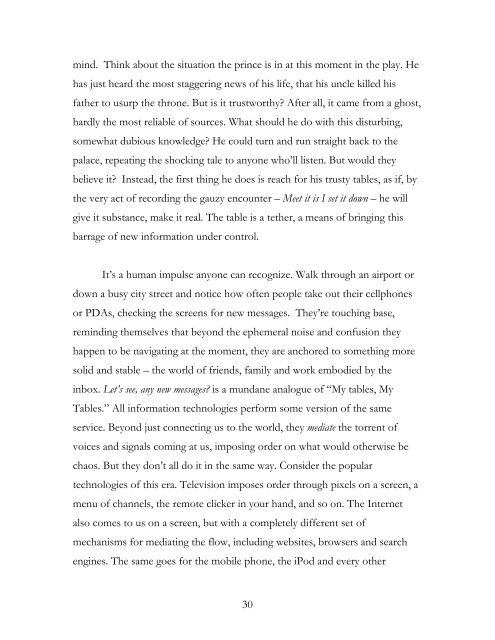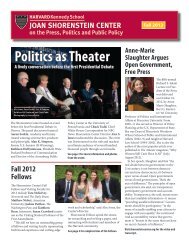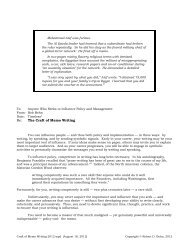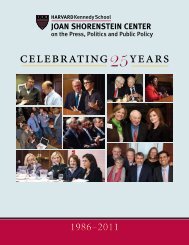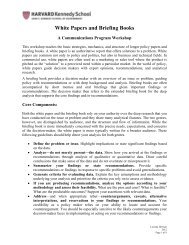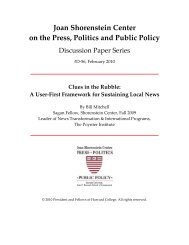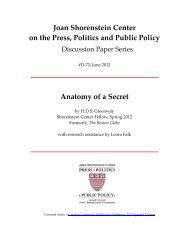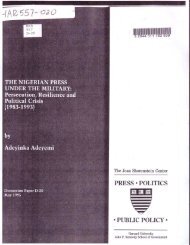Why Paper Is Eternal - Joan Shorenstein Center on the Press ...
Why Paper Is Eternal - Joan Shorenstein Center on the Press ...
Why Paper Is Eternal - Joan Shorenstein Center on the Press ...
Create successful ePaper yourself
Turn your PDF publications into a flip-book with our unique Google optimized e-Paper software.
mind. Think about <strong>the</strong> situati<strong>on</strong> <strong>the</strong> prince is in at this moment in <strong>the</strong> play. He<br />
has just heard <strong>the</strong> most staggering news of his life, that his uncle killed his<br />
fa<strong>the</strong>r to usurp <strong>the</strong> thr<strong>on</strong>e. But is it trustworthy? After all, it came from a ghost,<br />
hardly <strong>the</strong> most reliable of sources. What should he do with this disturbing,<br />
somewhat dubious knowledge? He could turn and run straight back to <strong>the</strong><br />
palace, repeating <strong>the</strong> shocking tale to any<strong>on</strong>e who’ll listen. But would <strong>the</strong>y<br />
believe it? Instead, <strong>the</strong> first thing he does is reach for his trusty tables, as if, by<br />
<strong>the</strong> very act of recording <strong>the</strong> gauzy encounter – Meet it is I set it down – he will<br />
give it substance, make it real. The table is a te<strong>the</strong>r, a means of bringing this<br />
barrage of new informati<strong>on</strong> under c<strong>on</strong>trol.<br />
It’s a human impulse any<strong>on</strong>e can recognize. Walk through an airport or<br />
down a busy city street and notice how often people take out <strong>the</strong>ir cellph<strong>on</strong>es<br />
or PDAs, checking <strong>the</strong> screens for new messages. They’re touching base,<br />
reminding <strong>the</strong>mselves that bey<strong>on</strong>d <strong>the</strong> ephemeral noise and c<strong>on</strong>fusi<strong>on</strong> <strong>the</strong>y<br />
happen to be navigating at <strong>the</strong> moment, <strong>the</strong>y are anchored to something more<br />
solid and stable – <strong>the</strong> world of friends, family and work embodied by <strong>the</strong><br />
inbox. Let’s see, any new messages? is a mundane analogue of “My tables, My<br />
Tables.” All informati<strong>on</strong> technologies perform some versi<strong>on</strong> of <strong>the</strong> same<br />
service. Bey<strong>on</strong>d just c<strong>on</strong>necting us to <strong>the</strong> world, <strong>the</strong>y mediate <strong>the</strong> torrent of<br />
voices and signals coming at us, imposing order <strong>on</strong> what would o<strong>the</strong>rwise be<br />
chaos. But <strong>the</strong>y d<strong>on</strong>’t all do it in <strong>the</strong> same way. C<strong>on</strong>sider <strong>the</strong> popular<br />
technologies of this era. Televisi<strong>on</strong> imposes order through pixels <strong>on</strong> a screen, a<br />
menu of channels, <strong>the</strong> remote clicker in your hand, and so <strong>on</strong>. The Internet<br />
also comes to us <strong>on</strong> a screen, but with a completely different set of<br />
mechanisms for mediating <strong>the</strong> flow, including websites, browsers and search<br />
engines. The same goes for <strong>the</strong> mobile ph<strong>on</strong>e, <strong>the</strong> iPod and every o<strong>the</strong>r<br />
30


